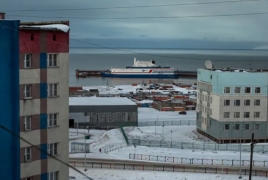Russia testing nuclear-powered shower as climate innovation November 5, 2021 - 14:01 AMT PanARMENIAN.Net - A remote Siberian town now has its own miniature nuclear plant as a Russian state company tests a new model for residential heating. Some see it as a tool to minimize climate change, The New York Times says in a fresh piece. Shower in people's homes comes courtesy of nuclear residentialA remote Siberian town now has its own miniature nuclear plant as a Russian state company tests a new model for residential heating heating, which remains exceedingly rare and was introduced in the remote Siberian town of Pevek only a year ago. The source is not a typical reactor with huge cooling towers but is the first of a new generation of smaller and potentially more versatile nuclear plants — in this case aboard a barge floating nearby in the Arctic Ocean. As countries from across the globe meet in Scotland this week to try to find new ways to mitigate climate change, Russia has embraced nuclear residential heating as one potential solution, while also hoping it can bring a competitive advantage. Companies in the United States, China and France are considering building the type of small reactors connected now to Pevek’s waterworks. “It’s very exciting,” Jacopo Buongiorno, a professor of nuclear science and engineering at the Massachusetts Institute of Technology, said in a telephone interview. These small reactors, he said, could also warm greenhouses or provide heat for industrial purposes. In bringing to life the new approach, he said, “the Russians are ahead.” Nuclear-powered residential heating is distinct from running space or water heaters with electricity generated from nuclear sources. Direct nuclear heating, tried in small pockets of Russia and Sweden, circulates water between a power plant and homes, transferring heat directly from fissioning uranium atoms to residences. Warming homes with nuclear power also has environmental benefits, advocates of the idea say. Primarily, it avoids wasting the heat that is typically vented as steam through the conical cooling towers of nuclear plants, and instead captures it for use in residential heating, if customers are fine with it. Still, some experts are concerned about the potential risks, pointing to the many spills and accidents on Soviet and Russian submarines and icebreakers that used similar small reactors. Nuclear submarines sank in 1989 and 2000, for example. “It is nuclear technology, and the starting point needs to be that it is dangerous,” said Andrei Zolotkov, a researcher with Bellona, a Norwegian environmental group. “That is the only way to think about it.” The experiment in Siberia, Professor Buongiorno said, could play a vital role in convincing countries that using nuclear power to limit climate change will require using it for more than just generating electricity, the source of about a quarter of greenhouse gas emissions. Authorities said a total of 192 Azerbaijani troops were killed and 511 were wounded during Azerbaijan’s offensive. In 2023, the Azerbaijani government will increase the country’s defense budget by more than 1.1 billion manats ($650 million). The bill, published on Monday, is designed to "eliminate the shortcomings of an unreasonably broad interpretation of the key concept of "compatriot". The earthquake caused a temporary blackout, damaged many buildings and closed a number of rural roads. Partner news |